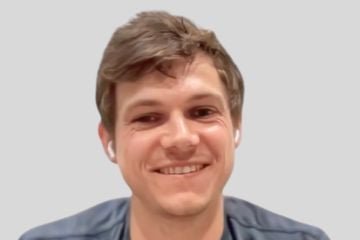For years, Jack Oswald has been a tourist tennis professional. He loved the best all over the world, the key to serious earnings. Rannings never came, but constant travel revealed the problem of annoying: his tennis bags were still breaking.
Thus, his passion for designing a better bag for athletes began. This led to Canch, a direct selling sports and travel bag that he launched in 2019 from his base in the UK
Jack and I have recently spoken. He discussed his transition to business – early fighting, increasing capital and more. Our whole sound is inserted below. The transcription is condensed and adjusted for clarity.
Eric Bandholz: Tell our guests who you are and what you are doing.
Jack Oswald: I am the founder of Cancha, which means “trial” in Spanish. We are designing design, modular sports and travel bags – equipment that easily moves between work, playing and fitness. Our mission is to ensure that sporting travels and help people remain active.
My background is in tennis. I spent years training and traveling to competition and chased a dream of going. I did not reach the top, but I learned a lot and gained valuable global experience, involved teaching French and Spanish.
Before the pandemic, I started to propose bags to meet the needs of athletes on the road – from court to city to nature. I had no background in the design of soft goods, but I entered. During the pandemic, traveling and tennis, I focused on full -time construction and learning electronic trading.
Our target market was initially traveling athletes, but most customers today are everyday players and recreational players. We are particularly popular in the US that represent 60% of orders. Brexit made sale in Europe more demanding, so the US has become our primary market. We also have a loyal customer base in Asia, they include Japan, Hong Kong and Singapore, although not in vain in these locals.
Bandholz: Tell us more about the transition from tennis to business.
Oswald: It was a long, gradual process. As a child, I believed that the note that Cream noticed me prevented me from Turn Pro. But the reality hit – tennis is hard to earn a living. Only 100 best players earn well and you often lose money for 150 in Rannings. Unlike football, where thousands of players feed on, tennis is financially brutal if you are not on top.
I gave it all – he was constantly traveling, chasing the rating of points and trying to survive every week. Grind was intense and you are often alone without the same restoration as competitors. Coach, decent accommodation or even food may vary significantly. Mental and physical tolls are huge, especially when they face loss of stripes or failures.
Finally, I realized I needed a new way. I would probably be constantly pushing if I did not find a new passion with Canch. Many of my peers fought for tennis, but I was Fortate to find something meaningful. Yet it took a year to move fully. I was still half -equalized when building a can, which gradually accepted that it was time to go further.
Bandholz: Making bags are expensive. Where did you take the money?
Oswald: It started scrappy. At first I didn’t spend much. I learned from friends who knew about the design of soft goods. Among the tennis tournaments, I was expecting trade fairs where I gave suppliers who generously offered samples, maybe I thought I was more established.
At the end of 2019, I made a crowdfunding campaign and increased approximately 10,000 GBP ($ 13,500). I had no marketing experience, but it provides a bit of capital to move forward. During the pandemic, we will receive a government loan for help that helped to finance our first production run and allow us to perform better design work. That was the main support.
We started with tennis bags because I knew it. The concept was a modular system Baks with accessories for shoes, laptops or wet equipment. First we tried our backpack with missile accessories, but it was too bulky. So we switched to a reserved tennis bag and from there we spread.
Having contacts in the American tennis space – reviewers and influencers – helped us get early traction. From there we grew up into other sports and more lifestyle bags.
The main reason for starting Canch was frustration – my tennis bags were still breaking. Tennis is a growing sport, but the industry itself remains largely traditional, especially in marketing. Most brands rely on sales representatives and retail and their bags are often poorly manufactured as leaders of loss for selling missiles. Unlike golf, where premium bags are norm, tennis bags lack innovations and quality.
I saw a gap for better materials, sophisticated design and durability. This has become our focus: premium, modular bags that meet the needs of modern players and travelers.
On the marketing side I also wanted to play a mug. Most of the tennis brands rely on the sponsorship of the players, but they come with restrictions – players who wanted to use our bags often could not. So we were directly at consumers through Emmerce and walked around the old guards at school.
Bandholz: How did your growth evolve?
Oswald: It was gradual. We had escape from advertising or donation – no success “Rocket Ship”. It was a constant improvement across the album. Our bags are meaningful coupes. They last for a long time and people are making time to make decisions. As a result, the acquisition is demanding, especially with increasing advertising costs.
Our limited production approach worked well. We leaned for this with e-mail marketing, which is needed in a limited edition, exclusive Colorways and brand cooperation in and outside. We also made many pre -orders.
Creating excitement The process of product development and lack has helped drive and interest. Instead of relying on one big channel, it was a mix: building hype, keeping a tight brand and slowly gaining confidence.
Bandholz: Do you have recurring buyers?
Oswald: Yes, and that was the strength. Our modular design allows customers to add accessories and naturally encouraging repeated purchases. People often buy the bag of the first bag and then return to accessories.
I suggest accessories to stand alone while AGSO integrates with our bags. This double approach gives us a crossover attraction – some people buy only a laptop bag while Ower creates a complete travel system over time.
Rolls also play limited drops. Customers offered feedback on what they want. This helps lead the future development of the product. In a few years we have spent more than $ 2,000. This kind of connection was the key to our growth.
Bandholz: Where can people buy your bags or address?
Oswald: Our site is mycancha.com. Co -covered undercast by Underdog ECOM for owners bootstrapped. I’m on X and LinkedIn.
(Tagstranslate) podcast






